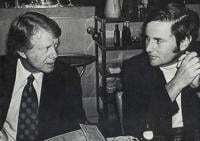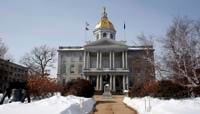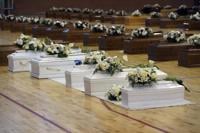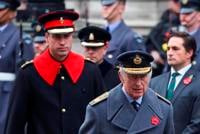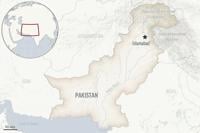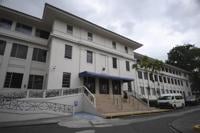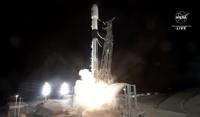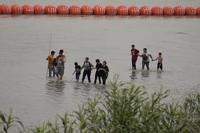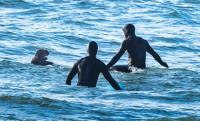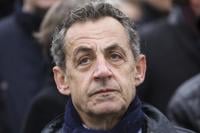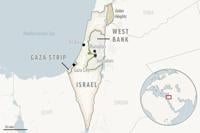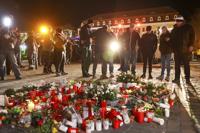WASHINGTON (AP) — Ever the outsider, Jimmy Carter served a turbulent term in the White House. His presidency was beset by soaring interest and inflation rates, gasoline pump lines and the Iran hostage crisis that eventually led to his re-election defeat.
But he rose to even greater heights with his post-presidential career, devoting another four decades to working as an international envoy of peacemaking and democracy. James Earl Carter Jr., a peanut farmer who became the 39th president of the United States, was awarded the Nobel Peace Prize in 2002.
—-
EDITOR’S NOTE — Walter Mears was an Associated Press special correspondent who won a Pulitzer Prize for his coverage of the 1976 presidential campaign. Prior to his death in 2022, Mears wrote this retrospective article in appreciation of Carter, who on Feb. 18.
—-
Trounced by Ronald Reagan in the 1980 election, Carter was, at 56, a politician with only a past and "a potentially empty life" ahead. Then, in 1982, he organized the Carter Center in Atlanta.
It kept him traveling, negotiating, leading election observation teams and speaking out, often to the discomfort or even resentment of the government he'd once led. Carter's Nobel citation honored "his decades of untiring effort" to resolve conflicts, promote democracy and foster economic development.
The man who conceded that some considered him "a failed president" made himself the most active and internationally engaged of ex-presidents. "My role as a former president is probably superior to that of other presidents," he said in a 2010 television interview.
When he ran for president as a one-term former Georgia governor, Carter was so improbable a candidate that he said his mother asked him, "President of what?"
To answer that and his all-but-invisible name recognition rating, he started campaigning early. Carter covered some 50,000 campaign miles, his garment bag draped over his shoulder.
He won the Democratic nomination and challenged President Gerald Ford, Nixon's appointed vice president.
Ford had pardoned Nixon for any Watergate crimes. In the aftermath of Watergate, Carter was the anti-Richard Nixon figure. "I will never lie to you," he told voters. But Carter was elected by only 2 percentage points.
The newly elected president and wife Rosalynn shunned the limousine and walked from the Capitol to the White House after his inauguration and tried to drop some of the pomp surrounding the presidency. But his solo style and unintended snubs left him short of political allies when he'd need their help.
For all that, Carter's term left landmarks, such as the Israel-Egypt peace accord he engineered in personal negotiations at Camp David in 1978.
He won the beginnings of an energy conservation policy. He gained ratification of the treaties that yielded U.S. control of the Panama Canal. He opened full diplomatic relations with China. The departments of energy and education were created. But his administration struggled and Carter shook up his Cabinet amid “a crisis of confidence.”
And then things got worse.
On Nov. 4, 1979, Iranian demonstrators invaded the U.S. Embassy in Tehran, incited by their ayatollah to retaliate for the exiled former shah's admission into the United States for medical treatment. Fifty-two Americans were held hostage for more than a year. Carter tried to negotiate, and when that didn't work, he ordered the military rescue attempt that failed disastrously in the desert in April 1980.
Eight Americans were killed in the attempt. It was Carter's bleakest hour.
The hostage crisis shadowed and essentially crippled Carter's re-election campaign. Sen. Edward M. Kennedy challenged him in the Democratic primaries.
After that, it was all uphill against Reagan. Carter carried only six states to Reagan's 44.
Minutes after Reagan was inaugurated on Jan. 20, 1981, the hostages were freed after 444 days in captivity. Carter's first major act as an ex-president was as Reagan's special envoy to welcome the freed hostages in Wiesbaden, Germany, the next day.
Jimmy Carter, the only president inaugurated by nickname, was born in tiny Plains, Georgia, where he arranged to be buried. The father for whom he was named was in the peanut business, with a farm and warehouse. His father, brother, Billy, and two sisters all died of pancreatic cancer.
Carter graduated from the U.S. Naval Academy in 1946, the year he married Rosalynn Smith, also of Plains. They had three sons and a daughter, Amy, the youngest child, who went with them to the White House.
Carter spent nearly seven years in the Navy's nuclear submarine force, resigning to take over the family business after his father died in 1953. His first political stop was in the Georgia State Senate. A Democratic moderate with a New South image, Carter was elected governor of Georgia in 1970, succeeding segregationist Lester Maddox and gaining his first national note when he declared in his inauguration address "the time for racial discrimination is over."
After he lost his presidential re-election bid, a shaken Carter retreated to Plains, to "an altogether new, unwanted" chapter in his life.
He began the Carter Center which, he said later, offered "superior opportunities to do good." He and Rosalynn also worked with Habitat for Humanity, building housing for the poor in the United States and abroad.
Carter was a tireless peacemaker who bypassed usual diplomatic channels and, as he said in 1994, went "where others are not treading" — places such as Ethiopia, Liberia and North Korea, where he secured the release of an American who had been imprisoned after wandering across the border in 2010.
He helped oversee democratic elections in Nicaragua and Haiti, and the first Palestinian elections. Altogether, he participated in 39 of the center’s 100 election observation trips.
Carter said his center "filled vacuums in the world. When the United States won't deal with troubled areas, we go there."
And not always quietly.
He went to Cuba in 2002, met with Fidel Castro, then delivered a televised speech calling for an end to the U.S. trade embargo. He likened Israeli policy toward the Palestinians to apartheid. He denounced the Iraq war as "based upon lies." He said George W. Bush was the worst president in history in foreign affairs.
That prompted a Bush White House spokesman to describe Carter as "irrelevant."
He could be meddlesome, a freelance diplomat who irked more than one administration.
But never irrelevant.


